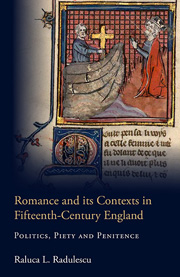Book contents
- Frontmatter
- Dedication
- Contents
- Acknowledgements
- Abbreviations
- Preface
- 1 Fifteenth-Century Contexts for the Reading of Middle English Romances
- 2 Spiritual Journeys through Political Realities: the ‘Pious’ Romances
- 3 Chronicling Britain's Christian Conversion: Henry Lovelich's History of the Holy Grail
- 4 The Politics of Salvation in Thomas Malory's Le Morte Darthur
- Afterword
- Appendix 1 Plot summaries
- Appendix 2 Genealogies
- Bibliography
- Index
1 - Fifteenth-Century Contexts for the Reading of Middle English Romances
Published online by Cambridge University Press: 05 October 2013
- Frontmatter
- Dedication
- Contents
- Acknowledgements
- Abbreviations
- Preface
- 1 Fifteenth-Century Contexts for the Reading of Middle English Romances
- 2 Spiritual Journeys through Political Realities: the ‘Pious’ Romances
- 3 Chronicling Britain's Christian Conversion: Henry Lovelich's History of the Holy Grail
- 4 The Politics of Salvation in Thomas Malory's Le Morte Darthur
- Afterword
- Appendix 1 Plot summaries
- Appendix 2 Genealogies
- Bibliography
- Index
Summary
The analysis of romance reception in the present study consists of two inseparable processes: a consideration of the texts within the fifteenth-century cultural and political context in which they were copied or written, and an examination of the manuscript contexts in which the romances have survived. The historical framework will be explored in the first part of this chapter, with a view to exposing the emergence and establishment of the main chosen thematic threads and their relevance to the study of Middle English pious and Grail romances. A clarification of how themes common to other periods received particular attention in the fifteenth century is required, because of the enduring belief, among some literary scholars, in the ‘dullness’ of fifteenth-century literature, dominated as it seems by commonplace and universal topoi, and the absence of critical consideration of romance reception outside educational (including ‘aspirational’) or leisure-oriented interests. The second part of this chapter sets out the discussion parameters, from structuring the corpus to challenges posed by the paucity of manuscript evidence of romance reception and the copying of romances alongside other texts within multi-text manuscript books. In the final section of the chapter I discuss the rationale behind the structure of this study.
Kings and rulers, suffering and penitence: shaping vocabularies of political debate
The importance of the two central themes of this study, the suffering king and genealogical anxiety, and their particular relevance to the period, starting from the deposition of Richard II (1399) to the last decades of the fifteenth century, can only be fully understood by considering the political and cultural background to the writing and copying of the romances under discussion.
- Type
- Chapter
- Information
- Romance and its Contexts in Fifteenth-Century EnglandPolitics, Piety and Penitence, pp. 1 - 39Publisher: Boydell & BrewerPrint publication year: 2013

